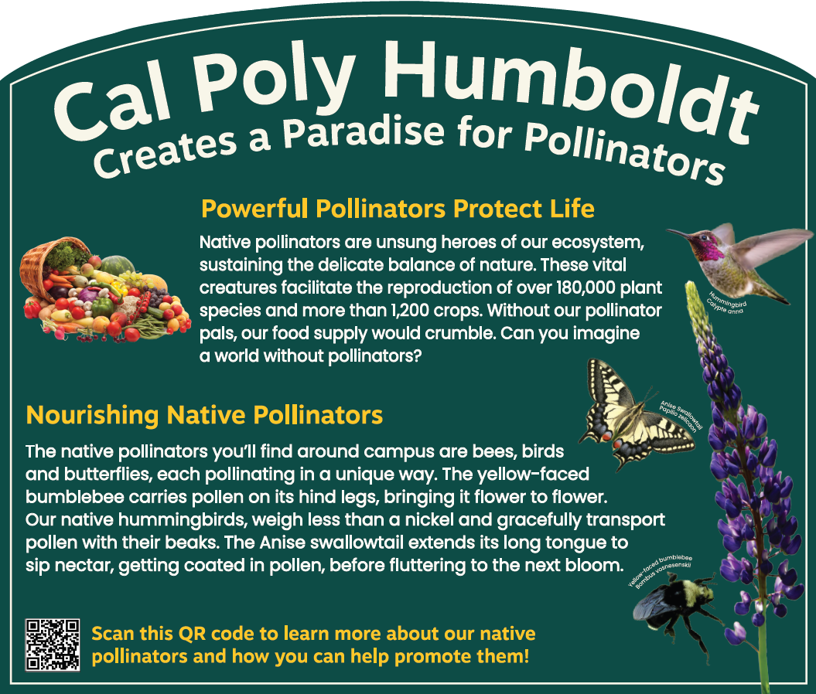Breadcrumb
Bee Campus USA
Cal Poly Humboldt is a Bee Campus USA Affiliate! We are working to conserve native pollinators by increasing the number of native plants, adding habitat, providing education and reducing the use of pesticides.
Bee City USA and Bee Campus USA are initiatives of the Xerces Society for Invertebrate Conservation, with a mission to galvanize communities and campuses to sustain pollinators by providing them with healthy habitats. The focus of this program is on native pollinators. And it's not just about bees! Butterflies, moths, beetles, flies and even hummingbirds are pollinators too!

Pollinator Facts, Maps and Resources
- Pollinators are necessary for nearly 85% of all flowering plants, including the crops that give us one in three bites of the food we eat.
- Pollinators are keystone species in essentially every terrestrial ecosystem on earth, assisting in plant reproduction and supporting other species of wildlife.
- Over 40% of native pollinator species are in decline worldwide, with some at risk of extinction, due to habitat loss, the use of harmful pesticides, disease, and climate change.
- We need pollinators, so we should do all we can to ensure that they have a safe and robust habitat.
- These and other pollinator facts can be found on the Xerces Society website.

Hummingbirds, Swallowtail butterflies, and Yellow-faced bumblebees are some of the more common native pollinators on the Cal Poly Humboldt campus. While you can see these and other pollinators all over campus, use the map to look for these pollinators at key locations on campus.
Cal Poly Humboldt Pollinator Map >>>
Humboldt is home to a wide diversity of bees, moths, and hummingbirds. Check out this catalog of native pollinators and key native plants for Humboldt County!
Native Pollinators of Humboldt County >>>
The Native Pollinator Bed is located in the CCAT Community Garden at the south end of campus across from the CCAT house. It is planted with California native perennials known to attract native pollinators, including butterflies, moths, hummingbirds, bees and more. You might even see monarch butterflies visiting the Showy Milkweed! So go out and visit the garden bed, and use this map to help identify the plants!
Native Pollinator Bed Map >>>
Did you know there is a pollinator garden at the northwest corner of Alistair McCrone Hall (AMH)? Check out this plant list and be sure to go visit the garden!
AMH Pollinator Garden Plant List >>>
Our Grounds Department utilizes these local suppliers for native plants.
Local Suppliers of Native and Pollinator Friendly Plants >>>
Cal Poly Humboldt developed its Integrated Pest Management Plan (IPM) in 2024, a set of strategies to prevent pest problems, reduce pesticide use, and expand the use of non-chemical pest management methods. As we reduce our impacts on pollinators, the Grounds Department is also working on developing additional pollinator-friendly areas on campus that utilize native plants.





